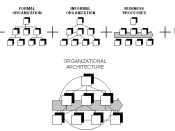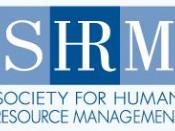IntroductionIn today's business world, there is a much higher level of competition between companies requiring each to seek new and more efficient ways to increase organizational performance. There are a number of ways in which firms can succeed (Irena Grugulis and Dimitrinka Stoyanova, 2006). The connection between training and skills could be one of the answers to this question. Especially, in the modern society, most people spend their working lives in an organization of some sort and therefore, have first-hand experience of organizational life (John Arnold, Cary L Cooper, Ivan T Robertson, 1998). However, many organizations are complex social systems and the search for a single generic cause of productivity and profitability is likely to prove fruitless (Irena Grugulis and Dimitrinka Stoyanova, 2005)Therefore, this assignment is to criticize the literature that connects training and skills in order to enhance levels of organizational performance. However, the evidence is contradictory and will require more time for researching in order to find the best answers for the best organizational performance.
The assignment attempts to critically assess the literatures that connect training and skills in order to enhanced levels of organizational performance. I begin my assignment by mentioning the concepts for both of skills and training. I continue with explaining the 'potentially' connection between 'training and organizational performance' and 'skills and organizational performance'. After that the evidences that connect training and skills in order to enhanced organizational performance will be identified. And finally the conclusion will be made based on what I have read and found out from many literature.
The concept of 'Skill'Skill stands out as the most difficult to pin down (Mike Noon, Paul Blyton, p140). Francis and Penn (1994) concluded that different occupational groups will categorize skill in different ways, which suggests that a person's conception of skill...


